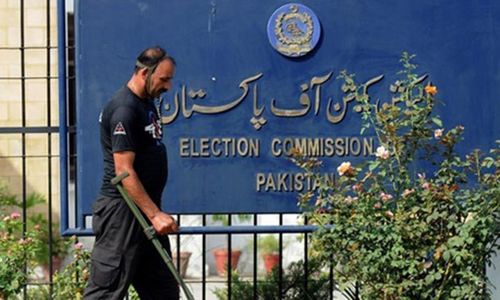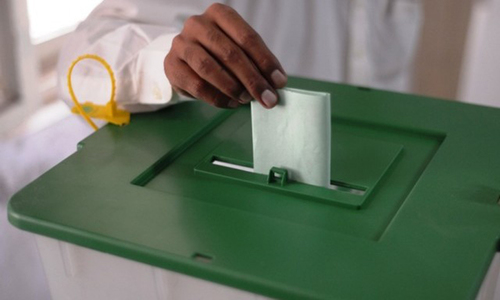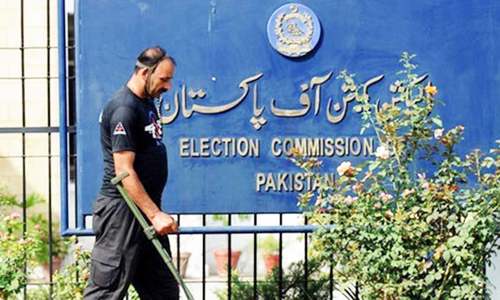Overseas Pakistanis can’t vote in 2018: ECP

ISLAMABAD: The Election Commission and Nadra informed a parliamentary committee on Tuesday that voters’ biometric verification, use of electronic voting machines (EVMs) and voting by overseas Pakistanis would not be possible in the next general elections (2018).
Sources told Dawn that Nadra officials, during an in-camera meeting of the sub-committee of the parliamentary committee on electoral reforms, raised a number of questions about the security of its data, if provided for online or offline verification of voters during elections.
Also read: ECP says it stands by its plan to give overseas Pakistanis right to vote
Similarly, the sources said, the ECP officials informed members of the committee, headed by federal Minister for Climate Change Zahid Hamid, that the mock exercise it carried out for voting by overseas Pakistanis in four countries had failed for a number of technical and legal reasons.
The ECP officials told the committee that they had carried out the mock exercise in seven embassies, high commissions and consulates in which only employees of the foreign missions had been asked to poll their votes for fictitious candidates through postal ballots and telephone voting.
Mock exercise carried out for voting by overseas Pakistanis in four countries failed for a number of reasons
However, the sources said, not even a single vote could be polled through telephone call whereas the postal ballots took six to 14 days to reach the ECP in Islamabad through diplomatic channels via the Foreign Office.
The mock polling was conducted at the Pakistani embassy in Riyadh (Saudi Arabia), High Commission in London (UK), and consulates in New York (US), Dubai (UAE), Manchester, Bradford and Glasgow (UK).
During the mock exercise, the ECP faced difficulties in handling only 67 postal ballots whereas 1.8 million overseas Pakistanis were living in Saudi Arabia alone. Another problem which the ECP had pointed out to the committee was that it had sent the ballot papers to overseas Pakistanis through email, whereas a significant number of Pakistanis working as labourers in foreign countries had no access to emails.
The other technicalities involved the sending of the ballot papers constituency wise on the basis of the addresses mentioned on their NICOP (National Identity Card for Overseas Pakistanis).
Previously, the committee members had been informed that even India had been unable for the last one year to allow its nationals living abroad to poll their votes due to a number of technical and legal reasons.
According to sources, the ECP informed the committee that it had set up a special department and cell in the commission on the issue to do research work. Similarly, the ECP has also formed a special committee under a director general on the same issue and it will comprise officials from Nadra and ministries of interior, foreign affairs, planning and development and finance.
The ECP officials told the committee that they had written a letter to the United Nations Development Programme (UNDP) to prepare a feasibility report on the issue of granting voting rights to overseas Pakistanis and its mechanism. The UNDP had been asked to submit its recommendations to the ECP as quickly as possible.
Talking to reporters after the meeting, the committee’s convener Zahid Hamid said “we have given a final shape to some 13 constitutional amendments to carry out electoral reforms”.
Mr Hamid said that Nadra had expressed some security concerns over introduction of biometric verification system in elections, but the committee had sought its final report within two weeks.
The minister said that the exercise carried out for overseas voting had failed also because the system could not be connected at the time of voting.
Mr Hamid said the committee had discussed the issue of powers and functions of caretaker governments, and in the next meeting the special assistant to the prime minister would inform members about the government’s point of view.
Published in Dawn, November 25th, 2015













































